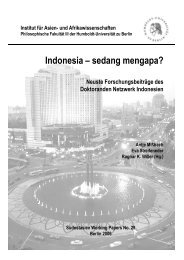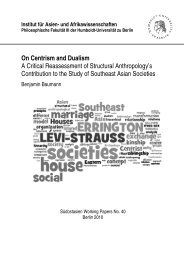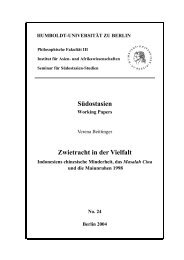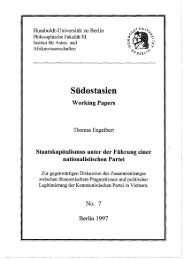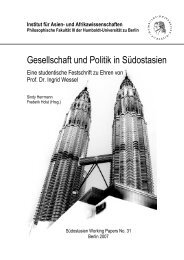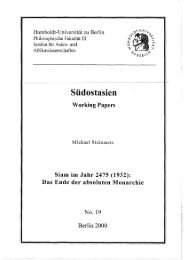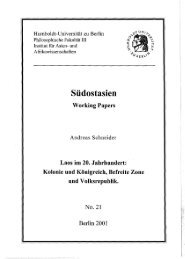Many commentators perceive religion to be the greatest threat to Western values, peace and security inthe era after the Cold War. 6 In the wake of September 11, 2001, the threat and practice of “ethnic conflict”that dominated the debate in the 1990s rapidly receded from the academic, journalistic, andpolicy spotlight as “global Islamic terrorism” came into view. Since, then the study of religious violencehas become “fashionable” within academia, think tanks and policy institutes: a “religiousviolence industry” has emerged. 7 In this view, the bloody clashes between Muslims and Christiansappear to be a showcase affirming the repeatedly voiced apprehension that religions are prone to violenceand may exacerbate conflicts during a process of democratization. Furthermore, in the context ofIndonesian history and religious thought, these developments appear to discredit what a religiouslyinspiredpro-democracy movement had achieved.Dismissing any mono-causal explanations, this article demonstrates the interaction of several developmentsboth in Maluku and in Jakarta and argues that only their combination led to the prolongedviolent conflict and it’s labelling as ‘religious’. It situates the violence and the discourse surrounding itin the context of Indonesia’s reformasi and demonstrates that the success of Muslim moderates madethem a target of religiously-framed political attacks that produced the decisive background againstwhich the violence in Maluku unfolded. I conclude that (a) the labelling of the violence as “religious”conceals more of the complexities and local motives for participation than it explains the violence, and(b) that the interpretation of the conflict as religious emerged in Jakarta and was instrumentalized inthe national post-transition struggle.A Short Synopsis of the Maluku ConflictOn January 19, 1999, on a Muslim holiday, an argument in Ambon City, capital of Maluku Islands,between a Christian public transport driver and at least one Muslim passenger deteriorated into anextensive brawl, escalateding into days of mob violence. Within hours of the incident, Christian andMoslem fighters were attacking neighbourhoods all over the city using traditional or homemadeweapons such as knives, spears, machetes, arrows, and Molotov cocktails. By the end of the day,numerous houses, stores, offices, churches and mosques had been destroyed or burned, scores of peoplehad been displaced, and many wounded or killed. 8During the first hours, residents were not alarmed because local fights between Christian and Muslimyouth groups were common in Ambon. 9 However, this brawl developed into a three-year long localcivil war. Cities and rural areas became highly segregated, local fighters distinguished each other byred and white headbands, and locals referred to the fighting groups as “Israelis” and “Palestinians”separated by the “Gaza Strip”. 10The conflict was considerably transformed when para-military units of jihad fighters arrived inMaluku to “protect” the Moslems and “wipe out” the Christian population. Home-made spears andmachetes were replaced by sophisticated guns. One year into the violence, sniper attacks killing bothChristians and Muslims with head-shots occurred on a daily basis, and full-time jihadists replaced the6Among others, see Mark Juergensmeyer (2000) Terror in the mind of God. The global rise of religious violence. Berkely,University of California Press, p. xiv. Tedd R. Gurr and Barbara Harff (1994) Ethnic Conflict in World Politics. San Francisco,Westview: 2.7Sidel, Riots, Progroms, Jihad.8This description follows Human Rights Watch’s report (1999) The Violence in Ambon. http://hrw.org/english/docs/|1999/03/17/indone824.htm9HRW, The Violence in Ambon, 5.10Patricia Spyer (2002) Fire without Smoke and other Phantoms of Ambon’s Violence: Media Effects, Agency, and theWork of Imagination. In: Indonesia, Vol. 74 , 21-36. Bräuchler, Birgit (2006) Konfliktfaktor Internet: Der Molukken-Konflikt geht online. In: Reuter et al. (ed) Strand bar Internet: Neue Orte der Globalisierung. <strong>Berlin</strong>, LIT-Verlag, 2006.16
fighting residents. Three years later, at least 6,000 people, possible as many as 10,000, had beenkilled. 11 Out of a population of 2.1 million, one-third had been displaced. Ambon City had beenseverely destroyed, numerous small villages wiped out, and a thorough segregation between Moslemsand Christians had taken place.The Maluku Conflict in the LiteratureSeveral books and numerous articles have been published on violence in Indonesia and the Malukuconflict. A few seminal books discuss Indonesia’s regime change and the transformation of nationalpower structures, linking communal violence to these large-scale factors. Jacques Bertrand argues thatthe practices of the authoritarian government, such as the pursuit of exclusionary policies targeted atspecific ethno-religious groups stirred existing animosities and inter-ethnic hatred. 12 Luca Manciniconcludes that in this context it may be no coincidence that violence exploded in 1997 in a climate ofregional instability and economic uncertainty in the wake of the financial crisis, and escalated dramaticallywith the power vacuum left by Suharto’s fall in 1998. 13However, only 14 provinces (out of 30) accounted for 96.4% of all non-secessionist communal conflictdeaths since 1990. 14 More strikingly, in 2000 only a mere fifteen districts whose share of thenational population did not exceed 7% accounted for 85.5% of all deaths in group violence. Withregard to the large-scale factors cited above, it is puzzling why there was for the most part in Indonesiano violence at all. 15John Sidel observed shifting patterns of collective religious violence from riots in provincial townsand cities in 195-97, anti-witchcraft campaigns in Java and interreligious pogroms in Central Sulawesiand Maluku in 1998-2001, to finally paramilitary mobilization and terrorist bombings under the signof “jihad” in 2000-2005 16 . Sidel comments that the origins of the fighting in Maluku were multi-layered, but does not provide a detailed account of the unfolding of violence in the province. RobertHefner links the rise of religious violence in the 1990s to the embrace of Islam and Muslim intellectualsby Suharto in the late 1980s. 17The International Crisis Group commented that many accounts over-emphasized confessional cleavagesas such a description would neglect other differences underpinning the conflict. It pointed out thatmost of the Christians in Maluku had been there for a long time, while a significant minority ofMoslems migrated during the last 30 years. 18 The Muslim immigrants were seen as more aggressiveand commercially more adept than the local Christians and had made enormous economic strides.Similarly, in 2000, then Indonesian Defence Minister Juwono Sudarsono commented that the conflict1112131415161718The International Crisis Group estimated in December 2000 that the conflict has cost more than 5,000 people their lives:ICG (2000) Overcoming Murder and Chaos in Maluku. Asia Report N°10, 19 December 2000. The Indonesian HumanRights Campaign Tapol estimates 9,000 deaths, Kopassus and the Maluku crisis, http://tapol.gn.apc.org/bulletin/2003/|bull169-70.htm#kopassus.Jacques Bertrand (2004) Nationalism and Ethnic Conflict in Indonesia. Cambridge, Cambrdige University Press.Luca Mancini, “Horizontal Inequality and Communal Violence: Evidence from Indonesian Districts”, Crise WorkingPaper No. 22, November 2005.Varshney et al. (2004) Patterns of Collective Violence in Indonesia (1999-2003). United Nations Support Facility for IndonesianRecovery – UNSFIR, Jakarta, 27.Sidel, Riots, Progroms, Jihad, 7.Sidel, Riots, Progroms, Jihad, xi.Robert W. Hefner (2005) Remaking Muslim Politics: pluralism, contestation, democratization, Princeton, Princeton UniversityPress.ICG, Overcoming Murder and Chaos in Maluku, 4.17
- Seite 1: Institut für Asien- und Afrikawiss
- Seite 4 und 5: SÜDOSTASIEN Working PapersISSN: 14
- Seite 7: VorwortBoryano Rickum und Eva Strei
- Seite 10 und 11: Theoretischer Zugang: Waldschutzkon
- Seite 12 und 13: Zum anderen ist ein weiteres Proble
- Seite 14 und 15: verbleiben die Landrechte beim Staa
- Seite 16 und 17: Dutschke, Michael/Wolf, Reinhard (2
- Seite 20 und 21: in Maluku was “basically not a re
- Seite 22 und 23: around Wahid’s NU, Megawati’s n
- Seite 24 und 25: groups were uniting against Suharto
- Seite 26 und 27: end to the military’s political r
- Seite 28 und 29: January 20, the second day of viole
- Seite 30 und 31: When violence broke out in Maluku i
- Seite 32 und 33: children, were burned to death in t
- Seite 34 und 35: support of some elements in the arm
- Seite 36 und 37: interpretations and instrumentaliza
- Seite 38 und 39: Soei Liong, Liem (2002) It’s the
- Seite 40 und 41: Malaysia) war einer der wichtigsten
- Seite 42 und 43: Rückkehr und ReintegrationBereits
- Seite 44 und 45: NGO-Aktivist. Beide Kandidaten hatt
- Seite 46 und 47: Gastland. Darüber hinaus finden wi
- Seite 48 und 49: tergehen. Die Unterzeichner und Her
- Seite 51 und 52: 4 Remembering the dark: The Japanes
- Seite 53 und 54: le for the creation of certain iden
- Seite 55 und 56: Remembering and forgettingWith thes
- Seite 57 und 58: These fragments of the social memor
- Seite 59 und 60: The policy of remembrance’s diffe
- Seite 61 und 62: ConclusionThe task of this essay wa
- Seite 63 und 64: 5 Euro-asiatische Kindheit im Batav
- Seite 65 und 66: mal 25 Jahre einschließen. Im Zent
- Seite 67 und 68: erzogen, lässt sich nicht verallge
- Seite 69 und 70:
Formale Voraussetzungen für eine e
- Seite 71 und 72:
Frau. Eine Frau durfte nie Vormund
- Seite 73 und 74:
Lebenshaltungskosten in Batavia war
- Seite 75 und 76:
Die fehlende Zuwendung des Vaters z
- Seite 77 und 78:
angelegt wurde, so z.B. zum Kirchga
- Seite 79 und 80:
ihrem Ehemann Joan van Hoorn an ihr
- Seite 81 und 82:
icht teilnehmen. Die Sorge um die K
- Seite 83 und 84:
asiatischen Familien und zum andere
- Seite 85 und 86:
Niederländer schickten ihre Kinder
- Seite 87 und 88:
Dies wurde allerdings verzeichnet,
- Seite 89 und 90:
Die meisten der Mischlingskinder wu
- Seite 91 und 92:
über das private Zusammenleben inn
- Seite 93 und 94:
Internetquellenhttp://hadith.al-isl
- Seite 95 und 96:
6 Freundschaft als soziale Praxis:i
- Seite 97 und 98:
laritäten und Überlagerungen mit
- Seite 99 und 100:
seiner Funktion auf individueller u
- Seite 101 und 102:
zunächst grob die wichtigsten sozi
- Seite 103 und 104:
Freundschaften „indonesisch“ od
- Seite 105 und 106:
Die Sphären lokalkulturell (javani
- Seite 107:
Haller Dieter (2001) Entwurf einer
- Seite 110 und 111:
Die Dia’ang betreiben als Bauern
- Seite 112 und 113:
tragen werden würde, die hier vorb
- Seite 114 und 115:
den traditionellen Schutz- und Gege
- Seite 117:
Über die AutorInnenNicola Borchard
- Seite 120:
22. Heinz Schütte (2003) Hundred F



